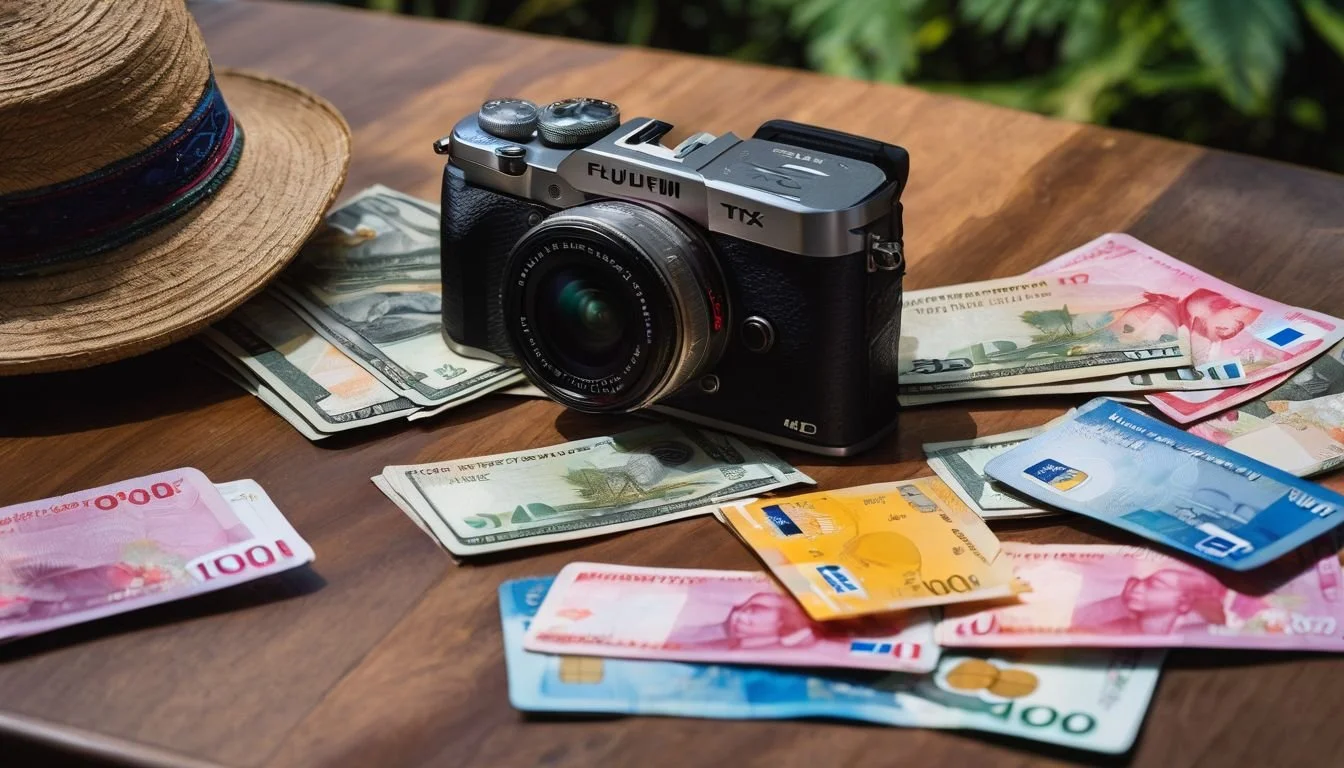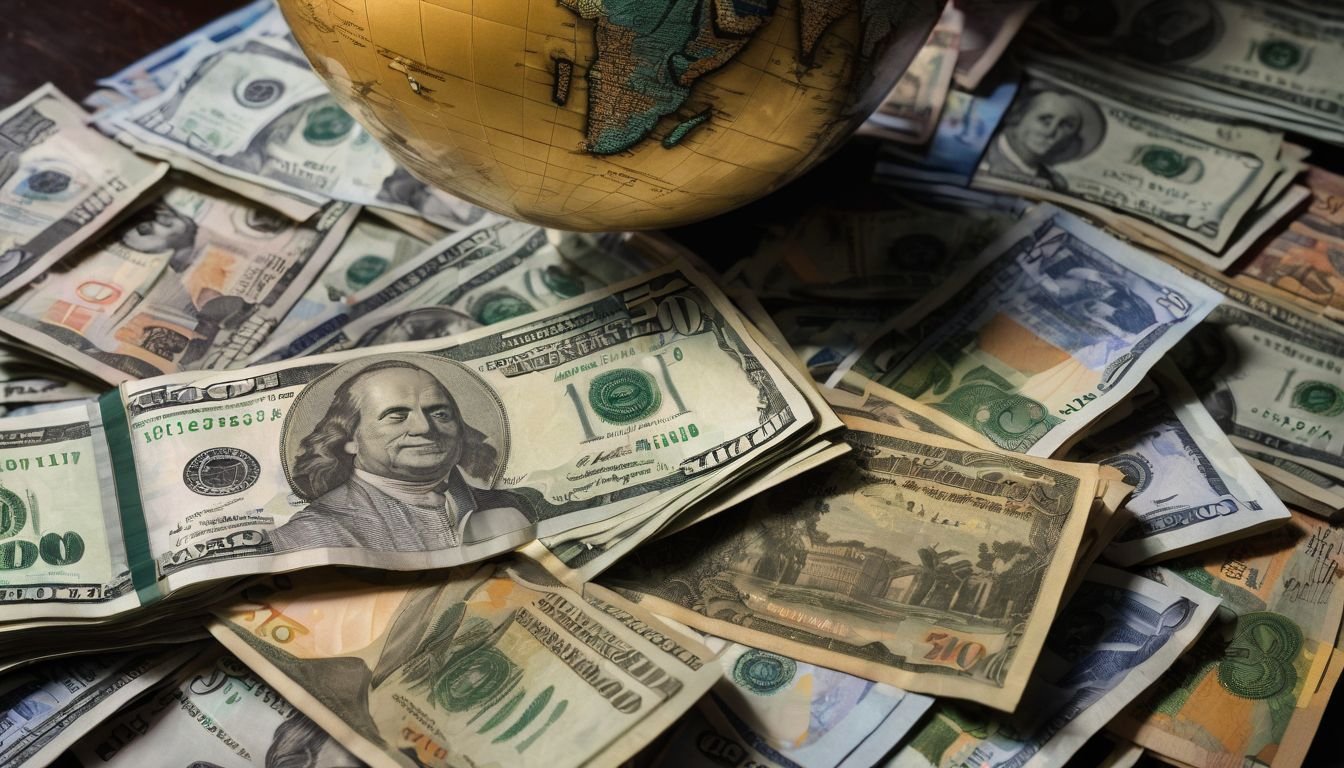Is it better to have cash or card in Bali?
Cash or card in Bali? | Digital art by Simon
Table of Contents Show
Is it better to have cash or card in Bali?
I think that it is best to have a mix of 40–60% cash and the rest of your travel budget on a card in Bali. For cash, if your currency is one of the readily-accepted currencies in Bali (see our list below), bring that to change at a reputable money changer in Bali. That will give you the best exchange rate. Otherwise, bring US dollars.
For the card, this should be a checking or savings account ATM card that is enabled for overseas ATM use. As a third backup, you could also bring your credit card. Read on for why I recommend this mix.
Can I use my debit card in Bali?
Yes, so long as you contact your bank and make sure it is enabled for use at overseas ATMs. Tell them you are going to Indonesia and give them your travel dates so your transactions are not flagged as suspicious.
Bali ATM fees
Most banks charge $1 to $5 per withdrawal (check with your local bank). This is still cheaper than using a travel card (which I do not recommend) so long as you don’t withdraw lots of small amounts.
Bali ATM withdrawal limit
Most ATMs in Bali allow you to withdraw a maximum of 1,250,000 rupiah (using 50,000 bill machines) or 3,000,000 rupiah (using 100,000 bill machines) per transaction. The total maximum withdrawal limit for a day is usually 6,000,000 rupiah.
Easily exchanged currencies in Bali
If you're traveling to Bali from Australia, Brunei, Canada, China, Denmark, Euro, Hong Kong, Japan, Malaysia, New Zealand, Singapore, South Africa, South Korea, Switzerland, Thailand, the United Kingdom, or the United States, there's no need to bring any Rupiah. Instead, bring your own currency and exchange it after you arrive in Bali. This way, you'll receive a favorable exchange rate and get more out of your vacation. Everyone else would be wise to bring US dollars to Bali.
Cash or card for Bali? Let’s look further into this question
If you're planning a trip to Bali, deciding whether to use cash or credit cards can be bewildering. As someone who's been making voyages to this tropical paradise for 25 years, I understand your question and I have carefully researched this topic.
Below, we'll explore the pros and cons of both payment methods in Bali, helping you make an informed decision. Ready? Let’s get started on how exactly cash and cards work in Bali!
Key Takeaways
Cash is widely accepted in Bali, making it easy to transact at local businesses such as restaurants, taxis, and market stalls.
Using cash can help you avoid foreign transaction fees and exchange rate fluctuations.
Cash provides greater control over spending as it is easier to track expenses compared to using a credit card.
Carry a mix of cash and card. The card just gives you the safety of being covered if your cash is stolen (unlikely, but best to be safe).
Want the full story?
Read our MEGA article, Bali Travel Tips for a complete list of tips and resources.
Other articles:
Pros of Using Cash in Bali
Cash offers several advantages when used in Bali. Cash is widely accepted, allowing for easy transactions at local businesses such as taxis, restaurants, beach bars, market stalls, and museums.
Cash also allows travelers to avoid foreign transaction fees and exchange rate fluctuations that may occur when using credit cards. Additionally, using cash provides greater control over spending as it is easier to track expenses compared to using a credit card.
Widely accepted
In Bali, cash is like a universal key, opening doors to the widest array of experiences. Market stalls, taxi rides, beach bars, and even museums welcome cash payments with open arms.
Similarly, credit cards have gained ground in places such as hotels and high-end restaurants. Even some tour operators embrace plastic money (and booking your tours online is bar far the better, safer way to go anyway!
Notably popular are Visa and MasterCard. Few establishments accept Amex or Diners.
Although professional money changers come into play for cash transactions, ATMs conveniently dot the Bali landscape for those inevitable times when you need more bills in your wallet.
So be it buying trips or trinkets at local haunts or dining sumptuously at posh eateries, you can't go wrong with either option, but don't forget about that potential 2-3% fee (charged by the establishment) and foreign conversion fee (charged by your bank) when swiping credit cards.
Avoid foreign transaction fees and exchange rate fluctuations
When traveling to Bali, it's important to consider ways to avoid foreign transaction fees and exchange rate fluctuations. By using cash instead of credit cards, you can save money and have more control over your spending.
With cash on hand, you'll have peace of mind knowing that you won't be charged extra fees or subject to fluctuating exchange rates.
Greater control over spending
I find that using cash in Bali gives me greater control over my spending. With cash, I can set a specific budget and only carry the amount of money I want to spend for the day. This helps me avoid overspending and impulse buying. If you are shopping and see something you really want, pop a small deposit on it, get a ‘nota’ (receipt) from the seller and come back the next day.
Plus, I don't have to worry about any unexpected charges or fees on my credit card statement at the end of my trip. It's a simple way to stay within my budget and keep track of my expenses while enjoying all that Bali has to offer.
Cons of Using Cash in Bali
There is a risk of loss or theft since cash is physically carried and can be easily misplaced or stolen.
Risk of loss or theft
I always advise travelers to be cautious about the risk of loss or theft when carrying cash in Bali. While it's true that cash is widely accepted and preferred in certain areas, such as local villages and markets, it also means you have to physically carry a significant amount of money with you.
This can make you a target for pickpockets or thieves - but I have to be straight with you, theft hardly happens in Bali. I’d be more worried about other travelers in hostel situations (don’t leave valuables in your luggage in shared rooms) than I would about a Balinese - I bet I could give cash to most Balinese and come back the next day with no problems….they are that trustworthy!
Of course, it's important to handle your cash securely and keep an eye on your belongings at all times. One tip is to split your money into different pockets or bags so that if one gets stolen, you still have some backup funds.
Another option is to use a money belt or hidden pouch under your clothes for added security. Remember, being proactive about protecting your cash can help ensure a worry-free trip in Bali.
Limited access to ATMs in more remote areas
ATMs in Bali may not be as readily available outside the main towns and tourist destinations. While there are ATMs located throughout the island, it's important to note that some remote areas and smaller villages may have limited access to cash withdrawal facilities. therefore, it is advisable to plan accordingly and carry enough cash with you when venturing into these areas.
Need for currency exchange
When traveling to Bali, it is important to be aware of the need for currency exchange. While credit cards are widely accepted in many establishments, cash is preferred on the street.
Additionally, some establishments may charge a fee for using a credit card. That’s why it's recommended to have a combination of cash and credit cards when visiting Bali to ensure you can easily pay wherever you go.
Remember to choose professional money changers and handle your money securely when exchanging cash in Bali.
My tip for picking a money changer: All reputable money changers have offices with a door and airconditioning. Yes, seriously. AC is a dea giveaway that the money changer is going to be honest, established, license (and cool!). This tip has worked for me without fail for 25 years to get the best rate with no scams. Bear in mind, the best rate is not the highest rate (the seedy booth-type joints on the street with the ‘amazing’ rate is where you will get scammed).
Pros of Using Credit Cards in Bali
Credit cards in Bali offer convenience and widely accepted payment options, added security and fraud protection, as well as a record of your transactions.
Convenient and widely accepted
Credit cards are a convenient and widely accepted payment method in Bali. Most hotels, restaurants, and tour operators in popular areas like Seminyak and Nusa Dua readily accept credit card payments.
It's also worth noting that Visa and MasterCard are the most commonly accepted credit cards in Bali, although some establishments may also accept Amex or Diners Club (but not many and I do not blame them because the fees they charge the merchant are punitive).
Offers added security and fraud protection
Using credit cards in Bali offers added security and fraud protection, which can give travelers peace of mind during their trip. When making purchases with a credit card, there is less risk of loss or theft compared to carrying large amounts of cash.
In addition, if there are any unauthorized charges on the credit card statement, most credit card companies have policies in place to protect consumers from fraudulent transactions. This provides an extra layer of security when using a credit card for payments in Bali.
Provides a record of transactions
Credit cards offer the advantage of providing a record of transactions while traveling in Bali. This can be especially helpful for keeping track of expenses and budgeting your spending.
By using a credit card, you will have a detailed statement that shows each transaction made during your trip, making it easier to review and reconcile your expenses when you return home.
Having this record can also be beneficial for personal or business purposes, as it provides documentation of where and when payments were made. Just make sure to keep your receipts and check them against your credit card statement for accuracy.
In addition to the convenience of having a transaction history, credit cards often offer online access to your account information, allowing you to monitor your spending in real-time.
This can help you stay on top of your finances while in Bali, ensuring that you are staying within budget and avoiding any unexpected surprises when it comes time to pay off your credit card bill.
Cons of Using Credit Cards in Bali
Foreign transaction fees and exchange rate markups can increase the cost of using credit cards in Bali.
Foreign transaction fees and exchange rate markups
When using credit cards in Bali, it's important to consider the potential drawbacks of foreign transaction fees and exchange rate markups. Some establishments in Bali may charge a fee, typically around 2-3%, for using a credit card.
Additionally, when making purchases with a credit card, there may be an exchange rate markup that can result in higher costs. It's essential to factor these fees into your budget and compare them against the convenience and security offered by using a credit card.
Limited acceptance in certain areas
In certain areas of Bali, such as smaller villages, the acceptance of credit cards is limited or non-existent. While major hotels, restaurants, and tour operators in popular tourist areas usually accept credit cards, it's important to have cash on hand when visiting these less developed areas.
Local shops, market stalls, beach bars, taxis, and smaller restaurants will only accept cash as a form of payment.
Risk of credit card fraud
Credit card fraud is a potential risk to be aware of when using your cards in Bali. While paying with a credit card is generally considered safe, it's always important to take precautions.
Some establishments may not have secure payment systems, making them vulnerable to hackers and scammers. It's advisable to use your credit card only at reputable businesses that have secure POS terminals.
Don’t hand your card over in a bar or restaurant for them to take away to the counter to process - wlak up to the counter and keep your card in sight while they process the transaction. Check the machine they use to make sure there is not an odd-looking card skimmer device attached.
Additionally, keep an eye on your statements for any suspicious activity and report any unauthorized charges immediately to your bank or credit card issuer. By staying vigilant and taking necessary precautions, you can minimize the risk of falling victim to credit card fraud while enjoying your time in Bali.
Conclusion
In conclusion, both cash and credit cards have their advantages and disadvantages when it comes to using them in Bali. Cash is widely accepted, helps avoid fees and exchange rate fluctuations, and provides greater control over spending.
However, there are risks of loss or theft and limited access to ATMs. On the other hand, credit cards offer convenience, security against fraud, and a transaction record. But they come with foreign transaction fees, limited acceptance in certain areas, and a risk of credit card fraud.
FAQs
1. What are the pros and cons of using cash and credit cards in Bali?
The use of both cash and credit cards in Bali has benefits and drawbacks, like currency conversion fees for cards or dealing with money changers when using cash.
2. Are there tips for paying with cash in Bali?
Yes, it's good to carry small notes for knickknacks and snacks and double check what you hand over because with all the zeros of Indonesian currency it’s easy to get confused and hand over a Rp100,000 bill instead of a Rp10,000 note!
3. Should I decide between bringing cash or a credit card to Bali, what do I need to know?
In deciding whether to bring cash or use a debit card in Bali, consider factors such as convenience fees on card transactions versus the safety risk of carrying around large amounts of money. I think a balance of 40-60% cash and the rest accessible on a card is the best.
4. Is it better to use cash or credit cards while visiting local markets?
You have to use cash in markets. The same applies to local warungs, street food stalls and many shops. Transportation drivers will also only take cash unless you are using an app or online booking, of course.















